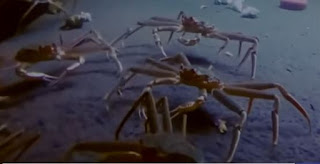The Alaska Board of Fisheries and North Pacific Fishery Management Council have taken this decision. The reason is the drop in the population of snow crab in the Bering Sea. It went below the regulatory threshold to open up the fishery. It seems their numbers dropped from around 8 billion in 2018 to 1 billion in 2021. This is according to Benjamin Daly. He is a researcher with the Alaska Department of Fish and Game. He revealed to a section of the media - “Snow crab is by far the most abundant of all the Bering Sea crab species that is caught commercially. So the shock and awe of many billions missing from the population is worth noting – and that includes all the females and babies.” Agencies have taken a similar decision for the Bristol Bay red king crab harvest. That also stands cancelled for the second year in a row. Officials cited overfishing as their rationale for canceling the seasons. It seems more crab were being caught than could be naturally replaced. Billions of snow crabs have disappeared from the waters around Alaska. Scientists say overfishing is not the cause. As an expert revealed, surveys conducted in 2021 and 2022 indicated that population of mature male snow crabs declined about 40 percent. As a result, there are an estimated 45 million pounds left in the entire Bering Sea.
The director for NOAA Fisheries in Kodiak lab differs. In his opinion, calling the Bering Sea crab population “overfished” does not make any mention about the cause of its collapse. He is Michael Litzow and he believes overfishing could not be responsible for the collapse. He says human-caused climate change is a significant factor in the alarming disappearance of crabs. He explains that these are cold-water species and found overwhelmingly in areas where water temperatures are below 2 degrees Celsius. The sea ice is disappearing due to the warm climate and the ocean around Alaska is becoming inhospitable for such species. Temperatures around the Arctic have warmed much faster than the rest of the planet. Climate change is responsible for triggering a rapid loss in sea ice in the Arctic region, particularly in Alaska’s Bering Sea.
Some popular stories of this blogger –
This year’s London Film Festival closed with ‘Glass Onion: A Knives Out Mystery’
SpaceX Crew-4 astronauts of NASA and ESA returned to Earth in a parachute-assisted splashdown
The mighty Mississippi River south of St. Louis is drying up because of drought
Greece depended entirely on renewable energy for five hours on a single day and used solar, wind and hydroelectric power
Prince Harry announced the return of Invictus Games to Canada in 2025 for the first-ever winter sports edition
Another incident of gun violence in North Carolina kills five, police arrests a 15-year-old boy
Unique flower market of Kolkata at Mullick Ghat on the banks of the Hooghly
Singapore redefines a city with an abundance of green spaces
Australia in the fury of floods with homes in Melbourne flooded, forecast says rivers will remain dangerously high for days


No comments:
Post a Comment